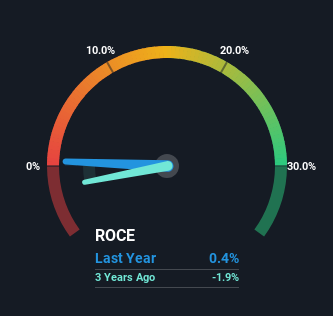Datadog (NASDAQ:DDOG) Shareholders Will Want The ROCE Trajectory To Continue
There are a few key trends to look for if we want to identify the next multi-bagger. Ideally, a business will show two trends; firstly a growing return on capital employed (ROCE) and secondly, an increasing amount of capital employed. Basically this means that a company has profitable initiatives that it can continue to reinvest in, which is a trait of a compounding machine. So when we looked at Datadog (NASDAQ:DDOG) and its trend of ROCE, we really liked what we saw.
Understanding Return On Capital Employed (ROCE)
If you haven't worked with ROCE before, it measures the 'return' (pre-tax profit) a company generates from capital employed in its business. To calculate this metric for Datadog, this is the formula:
Return on Capital Employed = Earnings Before Interest and Tax (EBIT) ÷ (Total Assets - Current Liabilities)
0.0043 = US$14m ÷ (US$4.1b - US$973m) (Based on the trailing twelve months to March 2024).
Therefore, Datadog has an ROCE of 0.4%. Ultimately, that's a low return and it under-performs the Software industry average of 7.2%.
Check out our latest analysis for Datadog
Above you can see how the current ROCE for Datadog compares to its prior returns on capital, but there's only so much you can tell from the past. If you'd like to see what analysts are forecasting going forward, you should check out our free analyst report for Datadog .
How Are Returns Trending?
We're delighted to see that Datadog is reaping rewards from its investments and is now generating some pre-tax profits. Shareholders would no doubt be pleased with this because the business was loss-making five years ago but is is now generating 0.4% on its capital. And unsurprisingly, like most companies trying to break into the black, Datadog is utilizing 2,894% more capital than it was five years ago. We like this trend, because it tells us the company has profitable reinvestment opportunities available to it, and if it continues going forward that can lead to a multi-bagger performance.
On a related note, the company's ratio of current liabilities to total assets has decreased to 23%, which basically reduces it's funding from the likes of short-term creditors or suppliers. This tells us that Datadog has grown its returns without a reliance on increasing their current liabilities, which we're very happy with.
The Bottom Line On Datadog's ROCE
To the delight of most shareholders, Datadog has now broken into profitability. Considering the stock has delivered 21% to its stockholders over the last three years, it may be fair to think that investors aren't fully aware of the promising trends yet. Given that, we'd look further into this stock in case it has more traits that could make it multiply in the long term.
On a final note, we've found 2 warning signs for Datadog that we think you should be aware of.
While Datadog may not currently earn the highest returns, we've compiled a list of companies that currently earn more than 25% return on equity. Check out this free list here.
Have feedback on this article? Concerned about the content? Get in touch with us directly. Alternatively, email editorial-team (at) simplywallst.com.
This article by Simply Wall St is general in nature. We provide commentary based on historical data and analyst forecasts only using an unbiased methodology and our articles are not intended to be financial advice. It does not constitute a recommendation to buy or sell any stock, and does not take account of your objectives, or your financial situation. We aim to bring you long-term focused analysis driven by fundamental data. Note that our analysis may not factor in the latest price-sensitive company announcements or qualitative material. Simply Wall St has no position in any stocks mentioned.

 Yahoo Finance
Yahoo Finance 
